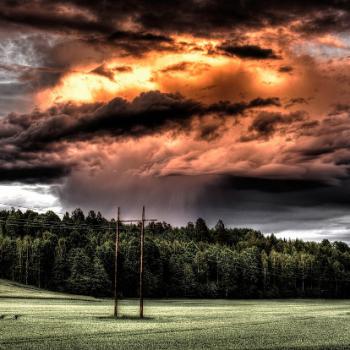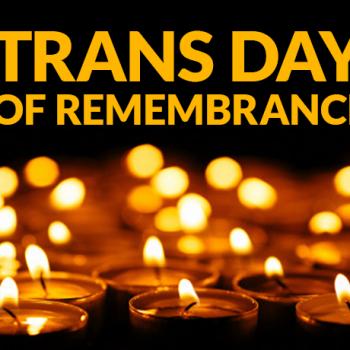
Rigidity and fundamentalism leads to bigotry and prejudice
Fundamentalism is a problem in all traditions, philosophies, and religions. There is an obvious and concerning connection between religious rigidity and bigotry. An appeal to “tradition” is…well, appealing. People like concrete ideas. Certainty leads to security. They like things spelled out for them. What to do, what not to do, and draw very narrow lines in the sand and build even smaller boxes on “acceptability”. And ever try to change someone’s mind once it’s been made up that something is 100% truth? Dogma can rule us all. And fundamentalism and traditionalism appeal to those who like very clear cut rules and rigid structures in their faith, ideas, and beliefs.
The problem lies within human nature. It’s definitely not just us as pagans, polytheists, occultists, etc. The issue is certainly not limited to any particular brand of religion, let alone polytheism. The most well known example among us would be the Asatru, who sadly have a large white supremacist movement they battle against on a regular basis. But the Celtic and Hellenic reconstructionists also have them. We ALL have them.
Sadly we all live in a society, and that society impacts much of our thinking and approach.
Race and spiritual tradition can be a horrible and dangerous mix
“Tribalism”, “ethnic”, “racial”, “folkish”: these are all common buzzwords for the same thing. The idea that genetics are important, theirs are superior, and anything less should be rallied against. Certainly one can take pride in one’s own heritage, tradition, background, and what-have-you. But lines are crossed when they become defining lines based on belief of other people’s “acceptability”. And now your own faith includes believing in that very superiority you supposedly have.
There’s something about fundamentalism which eventually leads to bigotry. Rigidity in religion tends to lead to rigidity in other areas. Religion and beliefs are often used as shields or excuses for bigoted behavior and speech. “I’m not the bigot, you’re the one who’s bigoted against my beliefs.” And their beliefs include a group or groups of people being inferior or deserving of restrictions more so than other groups. Homophobia, misogyny, transphobia, racism, and anti-Semitism are all examples of some of the “beliefs” which rigid traditionalists may cling to.
We all know that these sorts of people cry “white genocide” or try to claim marginalized status that they don’t happen to have. If you’re a white cisgendered dude, you’re still a white cisgendered dude. If the idea that you have privilege angers you, help us to change the system by recognizing that you’re more likely to underestimate a problem because you’re not personally impacted by it. That’s really all that privilege is.
Times and culture may change, but rigid traditionalists won’t
After all, if you are a part of a religion that discriminated against women in ancient times then feminism or any sort of equity among the genders would be “not applicable to your faith.” Similar deal with attitudes towards race and gender identity. And once again, if you’re not impacted by the issue(s) at hand, you’re more likely than not to underestimate how bad they are. You may have become convinced over time that they don’t exist, and this is where the trouble begins. If it (supposedly) didn’t bother the founders of your tradition and/or the ancients, why should it bother you?
And all traditions have roots in things that include problematic behavior and ideas. All. No exceptions. Which means we must evolve and evaluate over time.
Rigid traditionalists don’t evolve with the times. They’re stuck back in whatever century in the past they’re getting their ideas for their faith from. Never mind if current research contradicts any of those ideas. After all, those are THEIR ancestors. They would know more than historians, researchers, and actual historical record, right?
Religion isn’t the problem, it’s dogma
Too many people feel that religion is the cause of war and hate. And I would argue that it’s not religion, it’s dogma. ANY dogma in any lifestyle, philosophy, or belief system can lead to war and hate. Rigidity of thought leads to friction with others as well as fanaticism. Ever run into a militant vegan? I have on many occasions, and I am one. Trust me when I say that the infighting and “more vegan than thou” is a thing. How about someone with a different opinion in fandom than yours? Visit any of the Star Trek, Star Wars, or Doctor Who fanbases to see how toxic they can get (Yes, I’m a fan of all three). How about them Red Sox or Patriots teams? I’m from Boston, and all I can say on this topic is “Yikes.” Sports fans can be fanatic, we know this.
It’s unfortunately as I’ve said, dogma is the problem–not religion specifically. And why any and all philosophy, especially that based on tradition, should be willing to be flexible and move with the situation and/or times. We have to be open to change, and listen to differing opinions and research than our own. And accept the notion that our way may not necessarily be the best or even the right way. It’s just the one we happen to personally prefer.
What do we do about it?
I wrote about cancel culture and deplatforming the other day, and it’s certainly one idea on how to handle it. Rejection from the community is a start. If nothing else, it shows others what behavior is acceptable versus not. Obviously what you do is on a case by case basis depending on what the issues are.
There’s also self checks, too. At what point does our devotion to the gods go from fan to fanatic? “New convert syndrome” is a thing, and those fresh to the faith should be aware of that. Also, there’s being honest with yourself and what you’re looking for. What are you afraid of, and why does it include being “wrong” or doing the “wrong” things? Or is it others in your tradition encouraging you to be afraid? Peer pressure is a thing. How about those in an orthopraxic religion which relies on “right” practice as the defining quality of the faith versus “right” belief? In such traditions, how do you determine what is “right”? Who determines that? And when is cultural appropriation being used in an appropriate versus racist context?
Even in ancient times, the “right” practice wasn’t so concrete. Greek religion was more accurately Greek religions, as in plural. And in the modern day, different initiatory Wiccan lineages even exist. And a number of them are evolving or have already evolved on issues such as gender polarity. Autonomous covens within the same tradition can even have their own unique practices or takes on the tradition.
Looking for structure where there is none can be a headache. And I can see why people would try shoehorn structure onto a tradition or faith that doesn’t naturally have it. People crave certainty.
How do we know if our own approach and/or spiritual group is “fan” versus “fanatic”?
Here’s my own personal checklist to determine whether or not your own tradition/faith could use some reevaluation:
- Does the practice harm or otherwise isolate an existing marginalized group of people?
- Do your beliefs include the non-acceptance of an existing marginalized group of people, or total erasure? (“That’s not really a thing, they’re not real”)
- Is your faith interfering with your day to day life? Your responsibilities? Your mental, emotional, and/or physical health?
- Does the practice interfere with your overall level of happiness? Does it cause an undue amount of stress?
- How does your faith impact how you treat others? Do you treat differences in ideas with acceptance or disdain?
- Are you capable of changing your mind if presented with alternate evidence and research? Do you take being wrong well, or do you take it personally?
- How much time are you spending being more concerned with others’ practices than your own?
- Are you capable of “agreeing to disagree”? If not, where are you drawing that line and why? Think hard on this one and what hills you personally choose to die on.
- Is there an undue emphasis being placed on race, gender identity, sexuality, nationality, or ancestry in terms of “acceptable” versus “not”?
- Are you isolating yourself to only those within your tradition, or do you continue to socialize with others who aren’t?
- In your own tradition, are there others who are telling you who and who not to hang out with? Also see my blog on “what to avoid in groups and organizations“.
Sometimes we find groups that we think are initially a great fit but over time demonstrate qualities that would best be described as cultish. This is something to watch out for too.
















